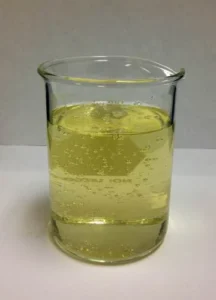In today’s beauty and skincare market, gentle yet effective ingredients are in high demand. Consumers are increasingly aware of what goes into their products, and harsh chemicals are being replaced with more skin-friendly, biodegradable, and non-toxic alternatives
In this blog, we’ll explore what Decyl Glucoside is, how it’s made, its uses in cosmetics, the benefits it offers for various skin types, and why it has become a go-to for natural and sensitive skincare formulations.

🔬 What is Decyl Glucoside?
Decyl Glucoside is a non-ionic surfactant derived from natural sources—specifically glucose (sugar) and decyl alcohol (which is obtained from coconut or palm kernel oil). In simple terms, it’s a plant-based cleansing agent that helps mix oil and water, allowing dirt and oil to be rinsed away easily.
It belongs to a group of surfactants known as alkyl polyglucosides (APGs), which are known for being mild, non-irritating, and environmentally friendly.
INCI Name: Decyl Glucoside
Appearance: Clear to slightly cloudy yellow liquid
Solubility: Water-soluble
pH Range: 5.5 – 12 (typically used in pH-balanced formulations)
🧪 How is Decyl Glucoside Made?
Decyl Glucoside is produced through a process called condensation. Here’s a simplified version of how it’s made:
-
Glucose (usually from corn or wheat) is reacted with
-
Decyl alcohol (derived from natural fatty alcohols in coconut oil).
This reaction creates a stable, biodegradable compound that retains the cleansing ability of surfactants without causing harm to the skin or the environment.
💧 Why Use Decyl Glucoside in Cosmetics?
With growing awareness around green beauty and clean ingredients, formulators are shifting towards ingredients like Decyl Glucoside for several reasons:
-
It’s mild enough for babies and people with sensitive skin.
-
It’s free of sulfates, which are often linked to dryness and irritation.
-
It is non-toxic and biodegradable, aligning with eco-conscious formulations.
-
It’s compatible with a wide range of pH levels, making it versatile.
🧴 Common Cosmetic Uses of Decyl Glucoside
Because of its mild nature and effective cleansing properties, Decyl Glucoside is used in a variety of skincare, haircare, and personal care products:
1. Facial Cleansers
Decyl Glucoside gently lifts away dirt, makeup, and sebum without stripping the skin’s natural oils—making it ideal for daily facial cleansers, especially for dry or sensitive skin.
2. Shampoos & Baby Washes
It’s commonly used in sulfate-free shampoos and baby products, where a mild lather is sufficient, and scalp irritation must be avoided.
3. Body Wash & Shower Gels
Provides a creamy lather and effective cleansing while being non-drying and gentle on the skin.
4. Foaming Hand Soaps
Decyl Glucoside creates a rich foam and is less likely to cause dermatitis or dryness from frequent washing.
5. Micellar Waters & Makeup Removers
Its solubilizing ability helps remove oil-based makeup and sunscreen while maintaining skin balance.
6. Toothpastes & Mouthwashes
Its non-irritating nature also makes it suitable for oral care, though less common than other surfactants.
🌟 Key Benefits of Decyl Glucoside in Skincare
✅ 1. Gentle and Non-Irritating
One of the most important benefits of Decyl Glucoside is its non-irritating and non-sensitizing properties. It is often recommended for:
-
Eczema-prone skin
-
Rosacea
-
Post-procedure skincare (e.g., after chemical peels)
✅ 2. Biodegradable and Eco-Friendly
As a plant-derived, 100% biodegradable surfactant, it poses no risk to the environment. It is ideal for sustainable and vegan skincare lines.
✅ 3. Non-Comedogenic
Unlike some harsh surfactants, Decyl Glucoside does not clog pores, making it suitable for acne-prone skin.
✅ 4. Excellent Foaming Properties
While it’s milder than sulfates, it still produces a satisfying lather, offering the sensory experience people expect from cleansers.
✅ 5. Compatible with Other Ingredients
It works well with other mild surfactants (like Coco Glucoside or Lauryl Glucoside) and does not react with cationic or anionic ingredients, making it flexible for formulators.
🧬 Is Decyl Glucoside Safe?
Yes. According to the Cosmetic Ingredient Review (CIR) and European Union cosmetic regulations, Decyl Glucoside is considered safe for use in cosmetics.
However, as with all ingredients, patch testing is recommended, especially for individuals with very sensitive or allergy-prone skin. Though rare, some people may experience mild irritation when used in high concentrations or with prolonged exposure.
❓Decyl Glucoside vs Sulfates – What’s the Difference?
| Feature | Decyl Glucoside | Sulfates (e.g., SLS, SLES) |
|---|---|---|
| Origin | Plant-derived | Synthetic |
| Gentleness | Very gentle | Can be harsh |
| Foaming | Mild to moderate | High |
| Environmental impact | Biodegradable | Not eco-friendly |
| Skin compatibility | Good for sensitive skin | Can cause dryness or irritation |
🌿 Ideal for Natural & Clean Beauty Products
Decyl Glucoside aligns perfectly with the “clean beauty” trend. You’ll often find it in products labeled as:
-
Vegan
-
Cruelty-free
-
Organic or natural
-
Hypoallergenic
It’s also free from parabens, sulfates, and synthetic fragrances, which is a big plus for many modern consumers.
🧠 Final Thoughts
In a world increasingly leaning towards gentle, natural, and sustainable beauty, Decyl Glucoside stands out as a hero ingredient. Whether you have sensitive skin, follow a green beauty lifestyle, or just want a reliable cleanser that won’t disrupt your skin barrier, this sugar-derived surfactant is a smart, skin-safe choice.
Its versatility, safety profile, and eco-friendly nature make it a staple in the future of skincare and cosmetic formulations.

